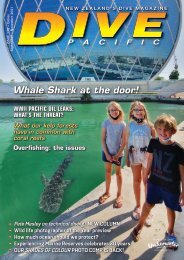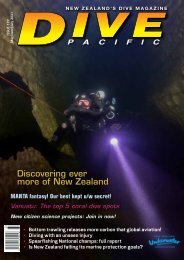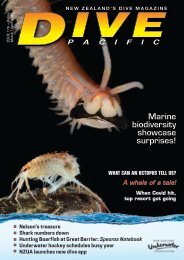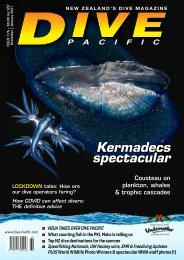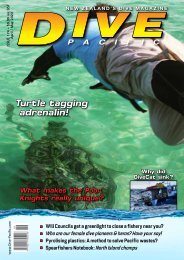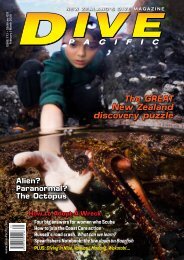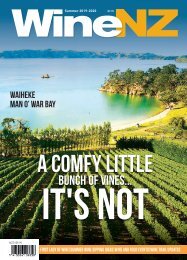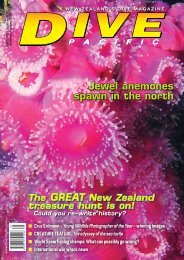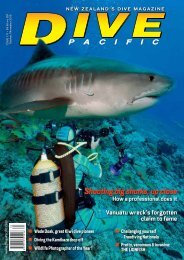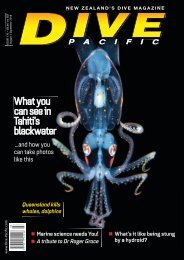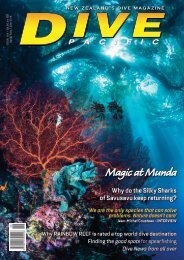WineNZ Summer 18-19 (1)
You also want an ePaper? Increase the reach of your titles
YUMPU automatically turns print PDFs into web optimized ePapers that Google loves.
feature | kevin judd<br />
What really happened at<br />
Cloudy Bay<br />
Kevin Judd and his faithful dog Dixie.<br />
It has been a decade since Kevin Judd<br />
established Greywacke, but despite<br />
his new label’s 10 successful vintages<br />
and growth into more than 40 overseas<br />
markets, the conversation inevitably leads<br />
back to Cloudy Bay, the world’s best-known<br />
New Zealand wine brand.<br />
The Cloudy Bay story has been re-told<br />
so many times not many won’t have heard<br />
it, but for anyone who has been out of town<br />
since <strong>19</strong>84, an abridged version is on the<br />
opposite page.<br />
Also re-told in various publications has<br />
been the story of how Kevin left the business<br />
he had been a part of for 25 years and had<br />
helped grow in to a phenomenon.<br />
The general theme of past articles has<br />
been that on his 50th birthday, Kevin had<br />
an epiphany, left Cloudy Bay to reinvent<br />
himself as the owner of his own successful<br />
winery.<br />
In one version of the story, the epiphany<br />
happened on an aeroplane when he bumped<br />
into a former Cloudy Bay employee who<br />
extolled the virtue of self-employment.<br />
While these stories are all rooted in fact,<br />
the actual departure was less Biblical in<br />
nature, more the sort of experience many<br />
of us have after having worked for too long<br />
in a corporate environment.<br />
Kevin gave his all to Cloudy Bay for a<br />
quarter of a century, under David Hohnen<br />
and later Veuve Clicquot (part of luxury<br />
goods group LVMH), which bought<br />
Cloudy Bay from David and brother<br />
Mark Hohnen in several chunks from<br />
<strong>19</strong>90 through to 2003, when David<br />
sold his last block of shares.<br />
While a key element in the business’<br />
success and growth, Kevin had no<br />
equity in the company and was still,<br />
basically, a wages slave. But it was<br />
a job he loved and he saw himself<br />
being there for the long haul. However,<br />
the issues of working in a corporate<br />
environment, changing reporting lines<br />
and restructuring, which could have<br />
taken Kevin out of winemaking, did<br />
weigh on his mind until he finally<br />
decided it was time to make a move.<br />
Leaving winemaking behind for a<br />
corporate role within the LVMH empire<br />
may not have been the right step for a<br />
man who enjoys the peace of the vineyard<br />
and the barrel room.<br />
When asked a few years back whether<br />
he’d prefer to spend time with a group<br />
of winemakers or with a group of<br />
photographers, Kevin replied that he’d<br />
actually rather be in the company of his<br />
dog Dixie.<br />
He has been described as a man of few<br />
words. When hearing that description, one<br />
wine writer said that he thought “few” was<br />
being generous.<br />
So it wasn’t an epiphany that resulted<br />
in Kevin packing his sandwich box and<br />
flask — more an accumulation of factors<br />
largely outside his control which eventually<br />
made his decision inevitable.<br />
When Kevin walked out the gate in<br />
2009, he was armed with a mountain of<br />
experience, and while Cloudy Bay’s success<br />
was partly the result of “right time, right<br />
place”, something that couldn’t be repeated,<br />
there were other aspects of the success<br />
Kevin had learnt and subconsciously filed<br />
away for just such a rainy day.<br />
The Greywacke name had been registered<br />
by Kevin in <strong>19</strong>93, so the idea of having his<br />
own label had been with him for a while;<br />
it just took a round of corporate changes<br />
to give him the push he needed.<br />
Greywacke, which he runs with wife<br />
Kimberley, is an interesting model. It only<br />
has a tiny quantity of its own grapes, buying<br />
most from established growers. It uses<br />
the Dog Point winery premises to make<br />
its wine, and you won’t find the brand on<br />
supermarket shelves.<br />
These business decisions were the result<br />
of lessons learnt over years in the industry.<br />
Having millions of dollars tied up in land<br />
and buildings wasn’t the way to get a<br />
new startup quickly into the black, was<br />
Kevin’s logic.<br />
What you do need, however, is excellent<br />
winemaking. Some say a chimpanzee could<br />
make Marlborough sauvignon blanc, and in<br />
some years, and with some fruit, possibly<br />
they could.<br />
But Kevin’s meticulous, perfectionist<br />
traits mean he has made some spectacular<br />
wines from sub-standard fruit, even in<br />
his early days with Selaks Wines, near<br />
Auckland. It was one of the factors that<br />
had caught the attention of David Hohnen<br />
of Western Australia’s Cape Mentelle<br />
Vineyards, who founded Cloudy Bay.<br />
That said, another of the factors that put<br />
Cloudy Bay at the head of the pack during<br />
Kevin’s years, was an unwillingness to drop<br />
standards. If fruit wasn’t up to scratch for<br />
the Cloudy Bay brand it wasn’t used, and<br />
would end up in the bottles of other wineries<br />
with different quality expectations.<br />
Kevin retains that perfectionist approach<br />
at Greywacke, where he makes wine only<br />
with the best fruit available — some of<br />
it coming from his former Cloudy Bay<br />
colleague Ivan Sutherland’s family vineyard.<br />
These wines are very good. A fact that<br />
underlines the point is that Greywacke has<br />
entered just three <strong>WineNZ</strong> tastings.<br />
I don’t want to toot our own horn too<br />
loudly here, but the <strong>WineNZ</strong> tastings are<br />
not like the supermarket tastings or the wine<br />
industry tastings, and they certainly are not<br />
like the one-man-sitting-at-home-handingout-gold-stickers-willy-nilly<br />
tastings. The<br />
<strong>WineNZ</strong> tastings are professional, with<br />
high-quality, paid judges, with the aim<br />
of providing consumers with an honest<br />
assessment as to which wines are worth<br />
buying. The judges are not influenced by<br />
the reputations of entrants, as they don’t<br />
know who they are.<br />
In that environment — against a big<br />
54 <strong>WineNZ</strong> Magazine | <strong>Summer</strong> 20<strong>18</strong>-<strong>19</strong>



